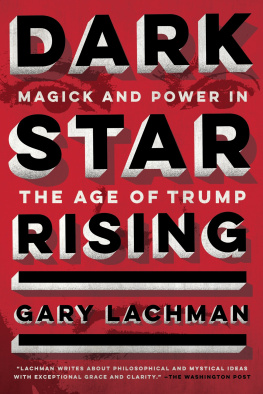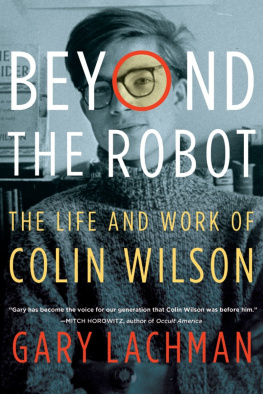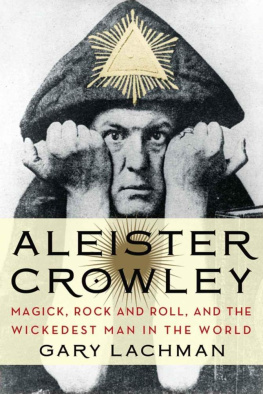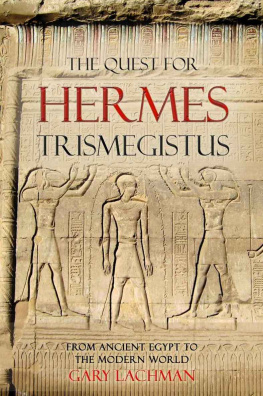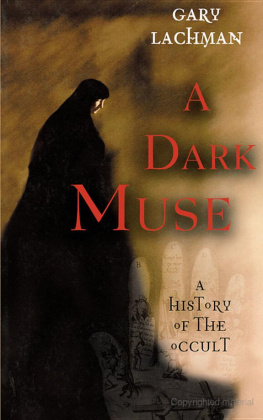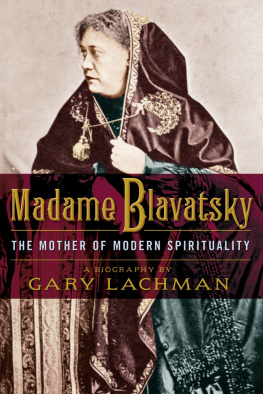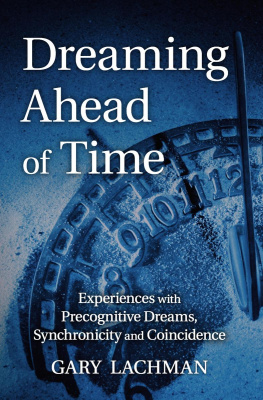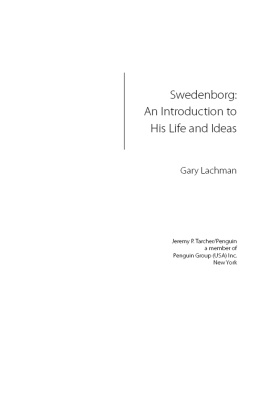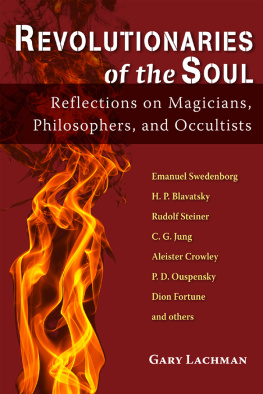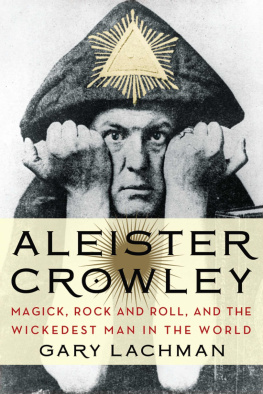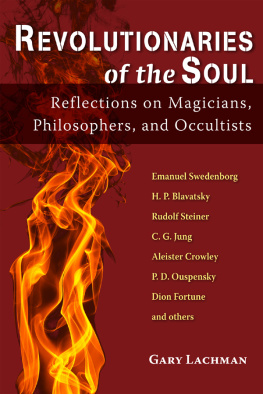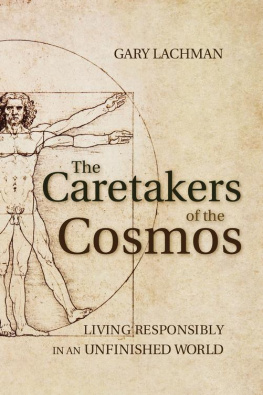
ALSO BY GARY LACHMAN
Lost Knowledge of the Imagination
Beyond the Robot
The Secret Teachers of the Western World
Revolutionaries of the Soul: Reflections on Magicians, Philosophers, and Occultists
Aleister Crowley: Magick, Rock and Roll, and the Wickedest Man in the World
The Caretakers of the Cosmos: Living Responsibly in an Unfinished World
Madame Blavatsky: The Mother of Modern Spirituality
The Quest for Hermes Trismegistus: From Ancient Egypt to the Modern World
Swedenborg: An Introduction to His Life and Ideas
Jung the Mystic: The Esoteric Dimensions of Carl Jungs Life and Teachings
The Dedalus Book of Literary Suicides: Dead Letters
Politics and the Occult: The Left, the Right, and the Radically Unseen
Rudolf Steiner: An Introduction to His Life and Work
The Dedalus Occult Reader: The Garden of Hermetic Dreams (ed.)
A Dark Muse: A History of the Occult
In Search of P. D. Ouspensky: The Genius in the Shadow of Gurdjieff
A Secret History of Consciousness
Turn Off Your Mind: The Mystic Sixties and the Dark Side of the Age of Aquarius
Two Essays on Colin Wilson
AS GARY VALENTINE:
New York Rocker: My Life in the Blank Generation with Blondie, Iggy Pop, and Others, 19741981


An imprint of Penguin Random House LLC
375 Hudson Street
New York, New York 10014
Copyright 2018 by Gary Lachman
Penguin supports copyright. Copyright fuels creativity, encourages diverse voices, promotes free speech, and creates a vibrant culture. Thank you for buying an authorized edition of this book and for complying with copyright laws by not reproducing, scanning, or distributing any part of it in any form without permission. You are supporting writers and allowing Penguin to continue to publish books for every reader.
TarcherPerigee with tp colophon is a registered trademark of Penguin Random House LLC.
Library of Congress Cataloging-in-Publication Data
Names: Lachman, Gary, 1955 author.
Title: Dark star rising : magick and power in the age of Trump / by Gary Lachman.
Description: New York : TarcherPerigee, 2018. | A TarcherPerigee book. |
Includes bibliographical references and index.
Identifiers: LCCN 2017048171 (print) | LCCN 2017059541 (ebook) | ISBN 9780525503804 | ISBN 9780143132066
Subjects: LCSH: OccultismUnited StatesHistory21st century. | MagicUnited StatesHistory21st century. | Political cultureUnited States. | White nationalismUnited StatesHistory21st century. | Right-wing extremistsUnited StatesHistory21st century. | United StatesPolitics and government2017| Trump, Donald, 1946
Classification: LCC BF1434.U6 (ebook) | LCC BF1434.U6 L33 2018 (print) | DDC 130.973dc23
LC record available at https://lccn.loc.gov/2017048171
Cover design: Gregg Kulick
Cover image: Pool / Pool / Getty Images
Version_1
To the Seekers of Truth:
The systematic use of imagination... will be requisite in the future, not only for the increase of knowledge, but also for saving the appearances from chaos and inanity.
O WEN B ARFIELD
Introduction
New World Disorder
S OME YEARS AGO I wrote a book that looked at the influence of certain occult or esoteric ideas on politics in the modern world. Occult means hidden and esoteric means inner, and in general both refer to aspects of reality that in some way exceed our standard, rational, scientific way of looking at things, what we can loosely call the magical. While mainstream science generally wants to debunk such notions, declaring them superstitious and absurd, they persist, and as I have tried to show in other books, they have formed a kind of countertradition of rejected knowledge that has informed Western culture and its history practically since they began.
One aim of my book Politics and the Occult was to show that while the popular view, promoted by writers like Umberto Eco, is that any kind of occult politics was distinctly on the right side of the political spectrum, this was not really the case. I argued that, on the contrary, there was a progressive occult politics too, whose influence on history could be found if we looked for it. It could be found, for example, in people and movements like the Rosicrucians of seventeenth-century Germany and the influence the Theosophists Helena Petrovna Blavatsky and Annie Besant had on India gaining independence from the British Raj.
Blavatsky is a good example of the bad reputation the occult has when it comes to politics. As author of the esoteric classic The Secret Doctrine, an immense occult history of mankind and the universe, she is often tagged as the source for the theories that, through their misappropriation by Aryan supremacist thinkers, fed the odious racial ideas of National Socialism. What is less often pointed out is that one of the most important influences on Mahatma Gandhi was his meeting with Blavatsky not long before her death and his introduction to the Hindu spiritual scripture the Bhagavad Gita by some Theosophist friends. As I show in my book about Blavatsky, the Gita became the most important book in Gandhis life and until his death he was thankful to Theosophy for his introduction to it. Even on the very day he was assassinated he wrote approvingly of Theosophy in his journal Harijan. This alone should suggest that a view of occult politics that places it solely on the right is inaccurate.
I still believe this is the case, and that a view of the occult that automatically links it to the political right wing is inadequate, presenting only half the picture. But this book will be different. Unlike Politics and the Occult it will focus on the link between the occult and far-right politics, not in the past but in the present, that is, today. Why is such a book needed, when I have gone out of my way to argue that occult politics should not be immediately shunted over to the far-right side of the political spectrum? Because in recent times it seems that the occult has entered politics again, and by most accounts it has not been invited in by the left.
Why do I say this? The pages that follow will, with any luck, present the evidence for what seems to be a new incursion of far-right occultism into the contemporary political landscape. But perhaps the best way to introduce this development is by explaining how I first came across it. It came, as most things do these days, through social media.
O N F ACEBOOK ONE afternoon, I came across something that Harvey Bishop, the New Thought blogger, had posted. New Thought, as readers may know, is a generic name for a variety of different beliefs, philosophies, and practices that have as their central theme the idea that the mind can influence reality directly, that through mental effort alone we can make things happen. Starting in its present form in the early twentieth century, it has had many revivals and is by now in some version a mainstay of New Age and spiritual belief. Some readers may be aware of New Thought through Rhonda Byrnes

